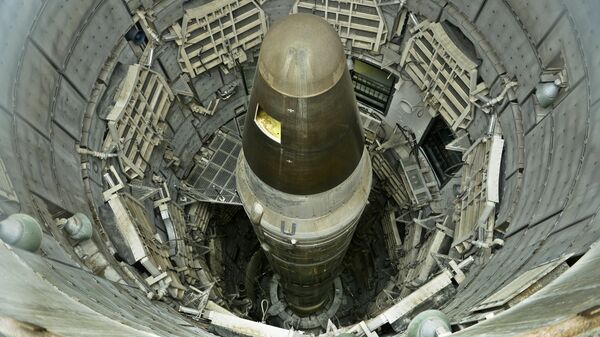Friday marked the official end of the INF Treaty between the US and Russia, despite Russia’s calls for dialogue over the past few months.
On top of that, US National Security Adviser John Bolton, addressing attendees at the 41st annual National Conservative Student Conference on Wednesday, claimed New START would be the next deal to go.
“It did not cover short-range tactical nuclear weapons or new Russian delivery systems. It is due to expire in February 2021, and while no decision has been made, it is unlikely to be extended. Why extend the flawed system just to say you have a treaty?" the adviser asked rhetorically.
Kevin Kamps, radioactive waste watchdog at Beyond Nuclear, joined the hosts of Radio Sputnik’s By Any Means Necessary on Friday to discuss what the end of the INF Treaty means for the world and explain why it's necessary for nations to reach new arms control agreements in this era of nuclear weapon proliferation.
“The Intermediate-Range Nuclear Forces Treaty signed by [US President Ronald] Reagan and [Soviet General Secretary Mikhail] Gorbachev in 1987 is a central pillar of US and Russian nuclear arms controls. And so its demise, its expiration, is a huge blow. And it’s a very serious matter,” Kamps told hosts Eugene Puryear and Sean Blackmon. “Unfortunately, thousands of nuclear weapons remain on hair-trigger alert between the two countries, and as these arms control agreements are dismantled, it just ratchets up the risks, and we find ourselves back in a Cold War, back in an arms race.”
Kamps referenced former US Secretary of State Henry Kissinger’s 2007 op-ed in the Wall Street Journal that said “unless urgent new actions are taken, the US soon will be compelled to enter a new nuclear era that will be more precarious, psychologically disorienting, and economically even more costly than was Cold War deterrence.”
Kamps reminded listeners that the US is the only country to have used nuclear weapons in warfare and said there is something “ironic” about the timing of the US pulling out of the INF Treaty, considering the anniversaries of the nuclear attacks on Hiroshima and Nagasaki are coming up on August 6 and 9, respectively.
“I think the United States very quickly became addicted to the power that nuclear weapons give to it internationally over other countries,” Kamps asserted. “The US was not counting on the Soviet Union catching up so quickly. It only took the Soviet Union four years to get a nuclear weapon.”
Fast forward to today, and it appears countries are going out of their way to add to their nuclear stockpiles to avoid being bullied on the international stage. But the proliferation of such weapons presents grave risks to the entire globe.
“We’re risking the planet. We’re certainly risking our countries, but we now know that just a hundred Nagasaki-sized bombs, which are relatively small, detonated, let’s say, between India and Pakistan, would be enough to plunge the planet into a nuclear winter that would starve 2 billion people to death. That’s what we’re risking with the existence of these omnicidal weapons.”
The watchdog added that the development of so-called “mini-nukes,” “tactical nukes” or “usable nukes” is cause for concern and a particularly slippery slope that could escalate into something catastrophic.
“Mini-nukes are already kilotons in size. [The nuclear bomb dropped on] Hiroshima was 15 kilotons in size. It took out a city,” Kamps explained. “As you introduce these usable nuclear weapons, that makes their use more likely. So we really gotta turn this tide around between various countries.”


